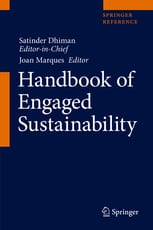Understanding ‘Engaged Sustainability’ – A Conversation with Dr. Satinder Dhiman
 “In order for sustainability to be sustainable, a profound psychological transformation has to occur at the individual and the collective level,” according to Dr. Satinder Dhiman, associate dean of the School of Business, chair of the MBA program and professor of Management. Focusing on the practice of environmental sustainability, the Handbook of Engaged Sustainability, his new major reference work , explores the application of sustainability in a wide variety of contemporary contexts—from economics of consumption and growth to government policy, sustainable cities, and sustainable planet.
“In order for sustainability to be sustainable, a profound psychological transformation has to occur at the individual and the collective level,” according to Dr. Satinder Dhiman, associate dean of the School of Business, chair of the MBA program and professor of Management. Focusing on the practice of environmental sustainability, the Handbook of Engaged Sustainability, his new major reference work , explores the application of sustainability in a wide variety of contemporary contexts—from economics of consumption and growth to government policy, sustainable cities, and sustainable planet.
We asked Dr. Dhiman about his new book:
Is there an academic understanding of sustainability that differs from the way the term is used in popular culture? If so, what does that consist of?
Yes and no. The academic understanding is invariably about studying the phenomenon of sustainability, its causes and possible solutions. Popular culture is all about “doing” sustainability. Our book captures both dimensions. It’s said that if half of the money we spend on studying the problem of poverty were actually spent on helping the poor, we would have alleviated poverty long ago. The situation is not much different with regard to sustainability.
In developing the schema for this handbook, I was dismayed to find out that there was no book that focused even closely on the “engaged” aspect of sustainability. That is perhaps why, that even today, if you search for key words “Engaged Sustainability” in Google, the Handbook of Engaged Sustainability comes up as the very first entry.
What good is sustainability if it is not engaged?
What do students find most challenging about sustainability? (e.g., the enormity of the topic, the role of individual actions, institutional/political inertia and worse, etc.)
Initially, they feel it’s too big of a topic to wrap their arms around — they feel powerless to do anything. However, when told that that they can in fact make a huge difference by doing one simple thing, they feel empowered and the needle begins to move. That one thing is switching to a whole food, plant-based diet. It’s good for them, good for the planet, and the most compassionate thing to do. We’ve seen it happen within seven weeks, in three separate sustainability courses offered during 2016, 2017 and 2018. Students who come from cultures where meat is the major part of their staple diet have turned vegetarian and/or vegan within that short span. It’s been the most gratifying experience for me.
Should we assume there’s a general consensus on the need for/importance of sustainability, even if consensus breaks down around the details (making it happen, in other words)?
Yes, there is, in principle. It’s hard for any discerning person to oppose the idea of sustainability or disagree about its need and importance, unless that person happens to be a politician. A reasonable person will see the “terror of the situation” immediately when presented with the scientific evidence.
How much do cultural/political/economic perspectives play in that consensus, or lack thereof?
All frames (cultural/political/economic/social) are critical as they all pertain to humanity. Sustainability is no longer an engineering problem — it is a human problem. Within this rethink of sustainability, the ethico-spiritual basis of sustainability is never out of the frame. By definition, the topic of sustainability requires a broad interdisciplinary approach – as in “our total footprint on the planet,” not just “our carbon footprint.”
Your book focuses on the psychological dimension of “engaged sustainability.” Did you solicit/include input from academics in that discipline and, if so, what major insights did they share?
There is no “ecology” without “psychology.” Our handbook is based on the premise that in order for sustainability to be sustainable, a profound psychological transformation has to take place at the individual and collective level. We present the insights that emerged in the form of a series of engaging affirmations:
- We believe that it is impossible to separate economic developmental issues from environmental issues. In its most practical aspect, sustainability is about understanding close interconnections among environment, society, and economy.
- We believe that the way to achieve sustainable, harmonious living in all spheres is through lived morality and spirituality at the personal level, team level, and societal level. We call it engaged sustainability.
- We believe that excessive desire, anger, and greed are subtle forms of violence against oneself, others, and the planet.
- We are not only unaware of these mental pollutants; we are often unaware how unaware we are.
- We believe that a focus on engaged sustainability will help us harness what is good for us, good for society, and good for the planet.
- We believe that achieving this goal will require a shift from being a consumer to being a contributor.
- Only an individual life rooted in the continuous harmony with nature – a life based on moral and spiritual awareness – can be sustainable for the entire creation.
Are you optimistic that a “profound psychological transformation” is possible in the near term, and why or why not?
I am highly optimistic that a transformation will occur during next three to seven years. The next decade is very crucial in this regard. We have to remember that we are “care-takers of the Divine property.” Sustainability transcends all differences — gender, ethnic, cultural, social. It has no particular faith. Its religion is humanity. Those in the know have a greater responsibility. We have one planet to live. Let us cultivate it together.
More information
 Handbook of Engaged Sustainability
Handbook of Engaged Sustainability
Satinder Dhiman, Editor-in-chief, and Joan Marques, Editor
(Springer, 2018)